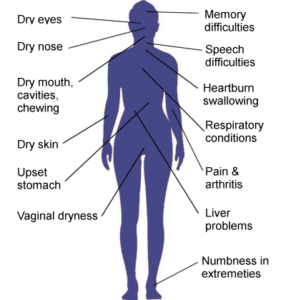
Out of nowhere I began developing dry mouth.
What can sudden onset dry mouth mean?
Could it mean the beginnings of Sjogren’s syndrome?
One day during the midst of working out at the gym, I began noticing that I was thirsty.
This might sound normal for someone working out, but for me, it was unusual.
I never crave water while lifting weights, but this time, I seemed to be thirsty and drank water.
I was still “thirsty,” and by the end of the workout, realized that this wasn’t actual thirst.
My mouth was dry. I didn’t think much of it until the day progressed and the dry mouth seemed to be getting worse.
There is an autoimmune disorder called Sjogren’s syndrome, and it’s characterized by a persistently dry mouth.

Symptoms that can be caused by Sjogren’s disease.
I wondered if I was developing Sjogren’s, because I already thought I might have a risk factor for it: microscopic colitis.
After being diagnosed with microscopic colitis, I learned that Sjogren’s is associated more with people who have microscopic colitis, though a definite link has not been established.
It’s actually not considered a risk for Sjogren’s, but still, my imagination went a little overboard.
The dry mouth was worse the next day, and the next, especially overnight.
It felt as though there was cotton in my mouth.
Drinking a lot of fluids was not the answer. This was not thirst. It was not dehydration.
Here is how you can tell the difference between dehydration and true dry mouth.
If you’re dehydrated or just plain thirsty, then the thought of a very chilled glass of your favorite thirst-quenching beverage will be extremely enticing.

Freepik.com/Racool_studio
If you have dry mouth, then imagining this tall, cold glass of your favorite drink won’t do anything for you.
I’d envision a tall ice-cold glass of lemonade, orange juice or water … and it did nothing for me; this confirmed (even though I already knew) that I had a mysterious case of really dry, cottony mouth.
My salivary glands weren’t working. I wondered if all four gland stations were being affected, or maybe two or three were.
If I deliberately held off on swallowing, this would allow some saliva to build up, but this didn’t correct the problem.
I also noticed that often, eating made the dry mouth worse, and my lips were also affected. The lips have salivary glands in them.
In Sjogren’s, biopsies of the lip are taken to diagnose for this disease.
On the fourth day I began placing a piece of diced lemon in my mouth to stimulate salivation, and this did a good job of relieving the dryness.

I’d keep the piece in there for a while, and when it was used up, I’d put another one in, and just keep it in there while working at the computer.
Funny thing, while working out at the gym, I noticed that the dry mouth subsided somewhat.
On the fifth day the dry mouth was noticeably suppressed, but I still sucked on a piece of lemon.
By night time there was a noticeable improvement, and on the sixth day, I no longer had dry mouth.
Causes of Sudden Dry Mouth
A sudden development of dry mouth is often caused by “salivary stones,” which are mineral deposits that settle at the salivary gland portal through which saliva is secreted.
But what is the origin?
“Dry mouth occurring in this way is usually the result of a nervous reaction, most commonly with a fit of anxiety,” says Morton Tavel, MD, Clinical Professor Emeritus of Medicine, Indiana University School of Medicine, and author of “Health Tips, Myths, and Tricks: A PHYSICIAN’S ADVICE.”
“I cannot think of any other or serious problems that could account for such a problem,” Dr. Tavel adds.
Often, the crystal-like debris resolves on their own. Other times, dentists must remove them.
One way to force these crystals to get lost is to suck on a piece of lemon.
This stimulates saliva production, and the saliva literally dislodges the crystals and hence, frees up the through-way for saliva, thus resolving the problem of dry mouth.
I took this assessment to my dentist at my next checkup, and she confirmed this process.

Dr. Tavel’s medical research includes over 125 publications, editorials and book reviews in peer-reviewed national medical journals. He was formerly director of the cardiac rehabilitation program at St. Vincent Hospital in Indiana. mortontavel.com
 Lorra Garrick has been covering medical, fitness and cybersecurity topics for many years, having written thousands of articles for print magazines and websites, including as a ghostwriter. She’s also a former ACE-certified personal trainer.
Lorra Garrick has been covering medical, fitness and cybersecurity topics for many years, having written thousands of articles for print magazines and websites, including as a ghostwriter. She’s also a former ACE-certified personal trainer.
.













